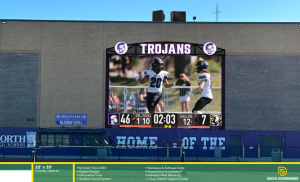‘Happy Holidays’ is the more inclusive phrase
December 9, 2019
When I was in elementary school, we would always have a “holiday sing-along” the day before going on winter break. The whole school would gather in the gym and we would sing many diverse types of holiday songs, ranging from “Dreidel” to “Feliz Navidad”. Our teachers would pick these songs to teach the newest generation that recognizing diversity in the holiday season is important. If a group of K-6 students can appreciate all types of winter holidays, so can you.
Christmas is not the only holiday in December. We need to acknowledge the other, equally important, holidays that occur during this festive season. The US is a very diverse place, and to assume that your chosen holiday is the most important one, is ignorant. The term “Happy Holidays” is much more inclusive.
Hanukkah, a Jewish holiday, is celebrated for 8 days and occurs typically during November or December (depending on when it falls in the Hebrew calendar). The holiday celebrates the dedicating of the second temple in Jerusalem. There are over 5 million Jewish people in the US alone, and more than 8 million come from some sort of Jewish descent. By choosing to not include 8 million people in wishing a happy celebration, over 2 percent of the US is being excluded.
Kwanzaa is the other main celebration that occurs during the holiday season. Kwanzaa is a week-long celebration to honor African heritage in African-American cultures. Each of the seven days of the week is dedicated to a different core principle of Kwanzaa. By wishing someone a “joyous Kwanzaa” without knowing if they come from African descent can be offensive to true African-Americans, so it is safer to use the term “happy holidays”.
Even in chain department stores like Target or Macy’s, where many get their festive decorations, there is a severe lack of representation of decor choices for other celebrations. I was roaming Target the other day and noticed the humongous section for everything Christmas taking over an entire corner of the store. I thought to myself, “where are all the other decorations?” As I went to check out I saw one tiny Hanukkah display on the other side of the store, basically out of sight.
The term “Merry Christmas” does not have to be completely banned from existence. If your family and friends celebrate Christmas, it is perfectly acceptable to use it with people whom you know the religious and cultural backgrounds of. You should use “happy holidays” if you are speaking to someone you don’t know or if you are speaking to a large following online.
Overall, the holiday season is a time to spread joy and happiness to others, no matter what heritage they may come from. By using the term “happy holidays”, you are including all types of religions and cultures in the festivities that occur.

























